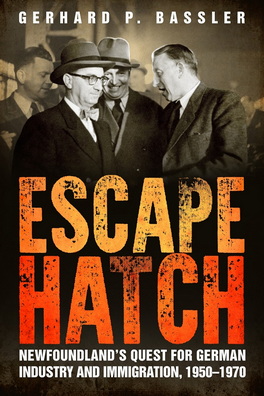Escape Hatch
Newfoundland’s Quest for German Industry and Immigration, 1950–1970

Beggars cannot be choosers. We wanted just companies, we gave a damn who they were, we had no prejudice against them. We went to Germany because Europe was scared of Soviet Russia and saw a communist revolution coming. The German industrialists were particularly scared. In 1950 I was the first public visitor who came to Germany from any country. The leaders of the German companies all spoke excellent English. I was impressed. I took every opportunity to speak to them and tell them that they should come to Newfoundland: “I’ve got an escape hatch for you, get established in my part of Canada, start a branch of your company in Newfoundland so you can have an escape hatch.” It was shrewd on my part. It fitted their mood. — Joseph R. Smallwood After Newfoundland joined Canada in 1949, Premier J.R. Smallwood believed that industrialization would prevent a mass exodus from the economically backward province to mainland Canada in search of employment. Escape Hatch traces Smallwood’s recruitment of each individual industry from the perspectives of both the Newfoundland government and the foreign industrialists. The book examines the conditions under which each of these industries operated and the reasons for their successes and failures. This is the first in-depth account of how and why the Newfoundland government acquired 17 so-called New Industries—13 from Germany, one from Austria, one from Latvia, one from England, and one from Newfoundland—as well as the 1,000 or so immigrants who came to Newfoundland and Labrador in the 1950s and 1960s as a result of Smallwood’s initiative.
My real reason for starting confederation was that I knew we could get economic development. . . . The moment I became premier I turned my mind and my body to one single job of getting Newfoundland developed. People have said that I fought for confederation with a single-track mind, letting nothing else interest me or interfere with me. Perhaps I did . . . but there is no perhaps about it when I say that I am fighting for economic development with a single-track mind. I sleep it, I eat it, I dream it . . . because to me it is as plain as the nose in my face that the one real job for the premier and Government of Newfoundland in the first few years after Confederation is the job of developing Newfoundland. That comes first. Everything else comes after. We must develop or perish. We must develop or people will go in thousands to other parts of Canada. We must create new jobs or our young men especially will go off to other places to get the jobs they can’t get here. Develop, develop, develop . . . that’s my slogan, and that will remain my slogan. . . . I want to get Newfoundland on the map. I want Newfoundland to be strong and prosperous, and not a drag on the rest of Canada.
And earlier in his budget speech of 9 May 1951 he had elaborated further that economic development was not an end in itself; rather, raising the standard of living in Newfoundland had always been his ultimate objective.When I speak of standard of living I mean something more than just food; something more than clothes. I am thinking of our schools and colleges, of our roads and streets, of our hospitals and clinics, of electric light and power, of playgrounds and swimming-pools and parks, of newspapers and magazines and radio, of hotels and tourist cabins, and of a score of other things which, when they are all taken together, are the measure of our civilization. I am thinking of people who are well-fed, well-clothed, well-housed, well-educated, well-informed. I am thinking of people who are too well educated, and too well informed to be humbugged and deceived by charlatans and demagogues—an educated, alert-minded people who take deep pride in their homeland and in their nation. . . . This is a philosophy of Newfoundland with which all Newfoundlanders must agree. . . . Can it be realized? This government is sure that it can, and this surety is the mainspring of our faith and of our programme . . . and this is the strength that gives such urgency to our course of action. . . . We feel there is no time to lose, no time at all. . . . And so, in spite of criticism, in spite of skepticism, in spite of jeering when we miscalculate or fail, we shall continue to press forward with all our strength and all our energy to the realization of the great good goal we have set before us.
To achieve that end, Smallwood was not afraid to pursue unconventional avenues and associate with anyone willing and able to help him. Smallwood’s first challenge in 1949–50, however, was how to get development that would keep the people on the island. Initially, Smallwood had been dealing with such big names in the world of North American business, investment banking, and industrial development as Nelson Rockefeller and his IBEC (International Basic Economy Corporation), and Sir William Stephenson, head of World Enterprises. But none of these had new ideas or concrete proposals. Most discouraging was the lack of interest shown by Canadian, American, and British industrialists in risking investment in this remote island-province with its rural lifestyle and a pre-industrial fishing economy. Newfoundland had a reputation as a cold, poor, backward, inaccessible place. Why would anyone want to invest? Smallwood was under growing pressure to do something sooner rather than later but lacked sound advice on how to proceed in the face of Newfoundland’s negative image. Unable to find anyone in Newfoundland with the competence to devise and direct a strategy of development, Smallwood’s friend Albert Perlin advised turning to Ottawa for help. C.D. Howe, Minister of Defence Production, and his director of industrial development, G.D. Mallory, thought Alfred Valdmanis would be a suitable candidate. Everything about his known record seemed to recommend him for the job. A finance minister in pre-war Latvia and recipient of Canada’s prestigious Lady Davis fellowship, he was acting as a consultant for two federal departments and was currently advising the Nova Scotia Research Foundation on the establishment of a cement plant. (More biographical information on Valdmanis can be found in the author’s 2000 book, Alfred Valdmanis and the Politics of Survival.)Gerhard P. Bassler has written an informative account of Smallwood’s New Industries.-- Miramichi Reader --
Even a reader with a minor interest in the subject will find it absorbing; anyone more engaged with it will find it invaluable.-- The Telegram --
Bassler is a meticulous historian.-- Atlantic Books Today --
Escape Hatch provides fascinating new insights into Newfoundland’s post-Confederation political, economic, and social history. Its transatlantic approach and innovative methodology make this an important source for any student of Newfoundland and Labrador’s turbulent mid-twentieth century.-- Acadiensis --
Shopping Cart
You have no items in your shopping cart
| Tax | Price | Qty | Total | |
|---|---|---|---|---|
| No items in the Cart. | ||||
| Sub Total | $0.00 |
|---|---|
| Shipping | $0.00 |
| HST (15%) | $0.00 |
| GST (5%) | $0.00 |
| Total | $0.00 |


















